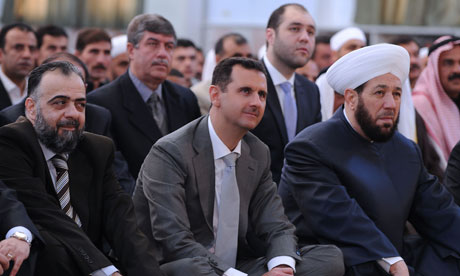The Assad regime's disdain for the Arab League's peace initiative
is another blow to the organisation's credibility
By Simon Tisdall

The continuation of the Syrian slaughter would seem to imply bad faith on the part of negotiators sent by President Bashar al-Assad (centre). Photograph: AFP/Getty
The
Syrian regime's refusal even to pretend to implement last week's peace
"road map" has provoked a portentous response from the deal's
diplomatically challenged progenitors, the Arab League. "The failure of
the Arab solution will have disastrous consequences in Syria and the
region," the 22-nation organisation's secretary general, Nabil el-Araby,
warned. What Araby did not say is that the apparent collapse of the initiative,
only days after its launch in Cairo last week, is a potential catastrophe for
the league, which was forced to call an emergency meeting after further deaths
on Sunday.
The
Syrian security forces' continuation of their daily slaughter of pro-democracy
protesters would seem to imply a staggering degree of bad faith on the part of
President Bashar al-Assad's negotiators. But there's another, more disturbing
explanation: that the military and security apparatus, not Assad, is running
the show and cares not a fig for external peace initiatives. On past form, this
latter explanation seems more probable.
Activists
said on Sunday that at least five people were killed in Homs province, central
Syria, as thousands of people protested on the first day of the Muslim Eid
al-Adha holiday. More were killed across the country. The UN-estimated death
toll in the seven-month uprising stands at around 3,000.
Given
this bloody context, the apparent impotence of Arab League mediation is deeply
damaging to the health of an organisation that was never particularly robust.
Araby's reference to the need for an "Arab solution" highlights a
bigger issue: the way the league and comparable organisations, such as the
African Union, often struggle to act effectively and collectively to resolve
regional problems, thereby increasing the onus on the west to act.
The
league has been floundering since the Arab spring began. Its former secretary
general, Amr Moussa badly misjudged events in Egypt. "I think President
Mubarak should stay until his term expires," he declared on 9 February,
two days before the Egyptian president was ousted. The league spectacularly
reversed itself over Libya. Its support for a no-fly zone was crucial in
securing a UN resolution authorising the Nato intervention that speeded Muammar
Gaddafi's downfall.
The
sort of divisions that have bedevilled the League over the Iraq war (2003), the
Darfur crisis in Sudan (2003-5), Lebanon (2006) and Somalia resurfaced over
this year's uprisings in Bahrain and Yemen. In these cases, Saudi Arabia took
the lead in supporting, more or less, the status quo. But Syria could not be
treated the same way. As the international outcry grew ever more shrill,
pressure on the league to take a strong stand, and criticism that it did not do
so, mounted inexorably. The league's convention that states do not interfere in
each other's internal affairs could not hold.
Even
so, its approach continued to be tentative. Michael Young, writing in the
National, said Assad demonstrated open disdain by delaying Araby's modest
bridge-building visit to Damascus in September. The league had to do better;
its indecision was a chronic condition, he said. "The continuing upheavals
in the Arab world have crippled the Arab League's effectiveness, never great in
the first place."
Hopes
of more vigorous intervention were raised when last week's much tougher Cairo
deal was unveiled, proposing a ceasefire, a military stand-down, and the
opening of a "national dialogue" on neutral ground. But so far, Assad
has ignored these undertakings, apart from a token release of 553 detainees.
The detainees were involved in the unrest in the country, but had "no
blood on their hands", the state-run news agency said. Thousands more
remain imprisoned.
The
Arab League faces a momentous, possibly make-or-break decision. To avoid a big
split involving the likes of Iraq, it either goes on pretending a peace process
is in place and the regime is genuinely engaged – at the risk of destroying
what little credibility it has left. Or it takes the courageous step of
expelling Syria, one of the league's six founding members in 1945, imposing
additional, punitive sanctions – and in effect sending a message to the west
that Arabs cannot manage Arab problems.
There
is a third option, of course: collective Arab military intervention to bring
Assad to book. Sadly, this sort of Lawrence of Arabia fantasy is out of
fashion.
-This commentary was published in The Guardian on 07/11/2011
-Simon Tisdall is an assistant editor of the Guardian and a foreign affairs columnist. He was previously a foreign leader writer for the paper and has also served as its foreign editor and its US editor, based in Washington DC. He was the Observer's foreign editor from 1996-98
-Simon Tisdall is an assistant editor of the Guardian and a foreign affairs columnist. He was previously a foreign leader writer for the paper and has also served as its foreign editor and its US editor, based in Washington DC. He was the Observer's foreign editor from 1996-98
No comments:
Post a Comment